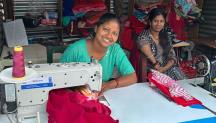

Let’s Not Forget, People Power Energy
Newsletter
In a world so rich in innovation and technology, it is easy to forget just how important people are to progress and development. This is especially true in the field of renewable energy. Every day, people play a vital role in the energy transition. Thanks to their dogged commitment, these individuals are helping to change our world.
Children in remote schools in Palau benefit from renewable energy so they can use computers and projectors; hybrid solar mini-grids deliver energy to rural communes in Mali. In Uganda, small businesses flourish due to low cost and reliable energy. None of this is possible without the energy source, but it is people whose ingenuity and determination drive the use of renewable energy to support lives and livelihoods.
This came to mind during my recent mission to Indonesia and a journey to the Life Learning Farm and dormant hydro-electric plant outside Cinta Mekar close to the town of Subang in West Java. The village is around 150 kms from Indonesia’s thriving capital city Jakarta. Run by the People Centred Economic Business Institute (IBEKA), the project is a not-for-profit and the brainchild of engineer Iskandar Kuntoadji.
IBEKA has a simple but powerful vision: local energy for local communities. Since the beginning, IBEKA has promoted community development by providing renewable energy from local sources of mainly hydroelectricity, while also offering clean drinking water. IBEKA works in partnership with rural communities to build micro-hydro plants producing electricity.
The projects offer training to local villagers in the operation of the plants, helps them develop a management plan, and sets reasonable prices for their use. Once constructed, IBEKA’s goal is to place the renewable energy system entirely in the hands of local communities. IBEKA’s efforts have been tremendously successful. As of 2012, 61 micro-hydro plants—51 are off-grid—provide life enhancing electricity to around 10,000 households. A further four plants, this time connected to the electricity grid, support another 1,500 households.
At the Life Learning Farm, where IBEKA trains people on the development and maintenance of micro-hydro power plants, I was inspired by Tri Mumpuni, the Executive Director of IBEKA. The recipient of a prestigious Ashoka Fellowship in 2006, Ms Mumpuni energetically explained how lives have been changed and communities benefited from the visionary project. Although currently out of use, local villagers are presently discussing with the national utility body how the dormant plant can come back on-line. I hope they are successful. Local communities need this project.
Ms Mumpuni explained that the project offers potential hope to the rest of Indonesia and is an outlier for how renewable energy benefits sustainable development in the country. She told me that the money from profit-sharing was being poured into other sustainable development activities. Money from the projects is educating school children, saving lives in health centres and empowering entrepreneurs to open local businesses.
My impression was of how water is capable of electrifying people’s homes and businesses, as well as their lives. Assisting them in times of their greatest challenges, while also giving them opportunities to succeed. There is no better example of the transformational powers of renewable energy.
I am grateful to the government and people of Indonesia not only for their wonderful hospitality, but for once again reminding me about the role played by people in the energy transition.

Expert Insight by:
Francesco La Camera
Director-General, IRENA
© IRENA 2025
Unless otherwise stated, material in this article may be freely used, shared, copied, reproduced, printed and/or stored, provided that appropriate acknowledgement is given of the author(s) as the source and IRENA as copyright holder.
The findings, interpretations and conclusions expressed herein are those of the author(s) and do not necessarily reflect the opinions of IRENA or all its Members. IRENA does not assume responsibility for the content of this work or guarantee the accuracy of the data included herein. Neither IRENA nor any of its officials, agents, data or other third-party content providers provide a warranty of any kind, either expressed or implied, and they accept no responsibility or liability for any consequence of use of the content or material herein. The mention of specific companies, projects or products does not imply that they are endorsed or recommended, either by IRENA or the author(s). The designations employed and the presentation of material herein do not imply the expression of any opinion on the part of IRENA or the author(s) concerning the legal status of any region, country, territory, city or area or of its authorities, or concerning the delimitation of frontiers or boundaries.




